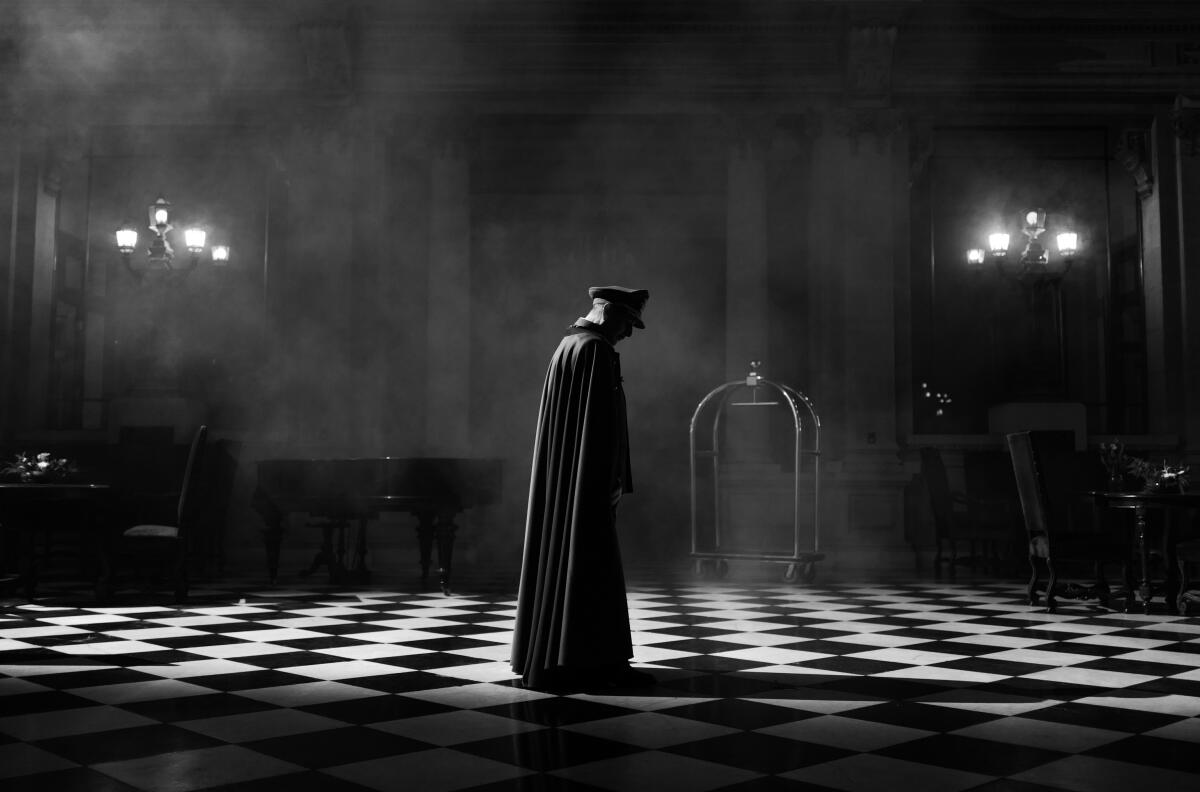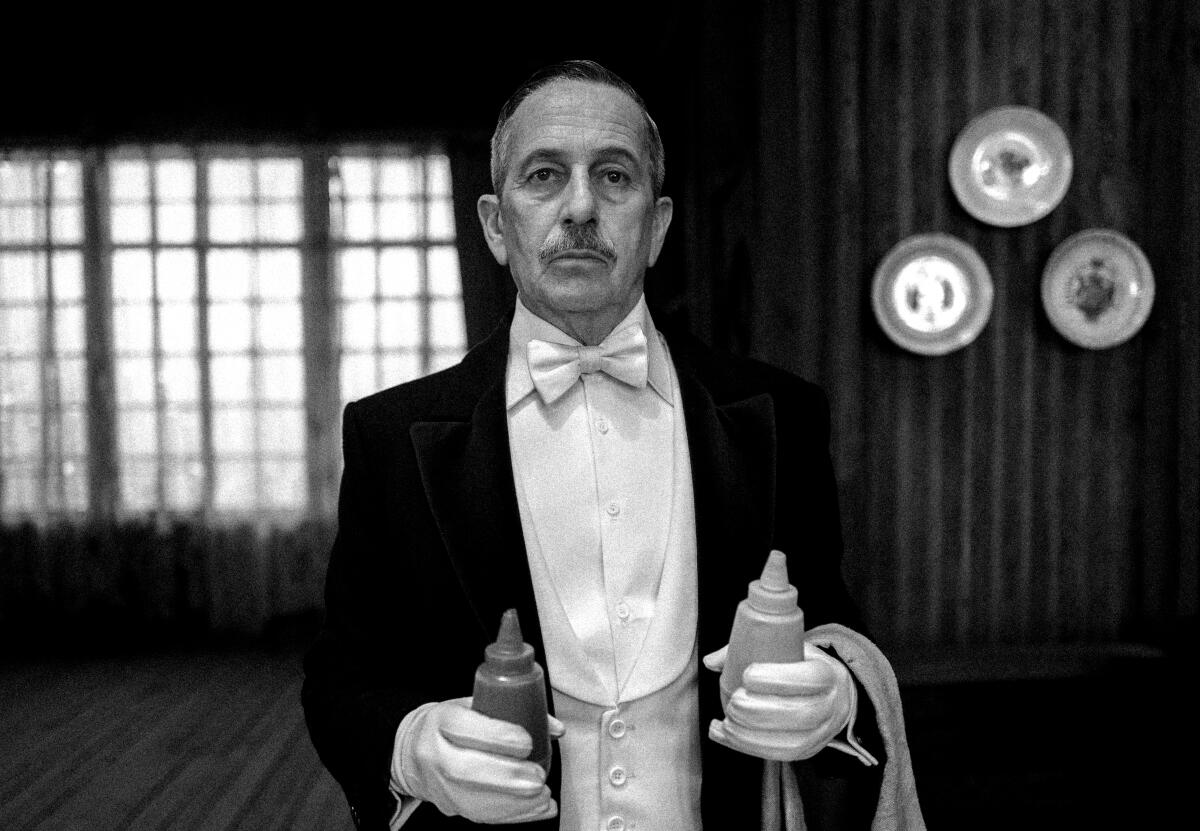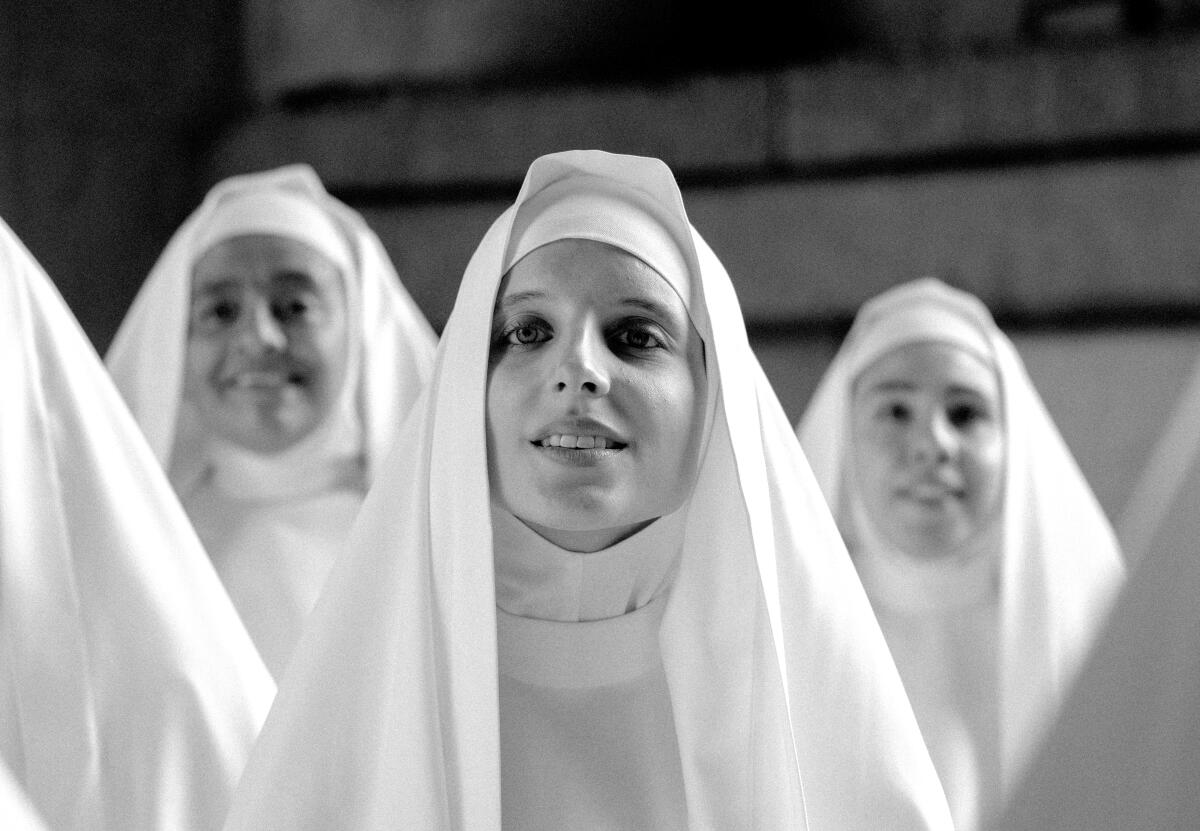Review: A dictator as Dracula? Netflix’s horror-comedy ‘El Conde’ doesn’t draw blood

- Share via
Pablo Larraín’s “El Conde” takes flight at precisely the moment its first vampire does. Wearing an army commander’s cap and a dark, billowing cape — respective emblems of military might and supernatural power — he lifts off lightly from the ground, soars over mountains and past the gleaming skyscrapers of Santiago, Chile, touching down on a rooftop with silent grace and murderous intent. He has a curvy, evil-looking knife and a thirst for human blood, which he satiates by puréeing his victim’s still-beating heart into a sanguine super-smoothie. Adding insult to fatal injury, he appears to use the victim’s blender rather than bringing his own; there’s only so much room, after all, under a cape.
Bitingly funny, bountifully gory and mercifully filmed in black-and-white (by veteran cinematographer Ed Lachman), “El Conde” spins a haunted, hemoglobin-rich origin story for brutal dictator Augusto Pinochet, who led the 1973 military coup that overthrew President Salvador Allende’s socialist government and plunged Chile into 17 years of terror and trauma. Larraín, a child of the Pinochet years, knows the historical terrain well. Famed in the U.S. for his starry bio-portraits “Jackie” and “Spencer,” he came to prominence years ago with a trilogy of independent Chilean movies set during the dictatorship, though none of them — the grim character studies “Tony Manero” (2008) and “Post Mortem” (2010), the thrilling democracy-now drama “No” (2012) — has taken Pinochet himself as its direct subject.
And so Larraín’s decision to finally place the man himself front and center, albeit in the form of a decrepit 250-year-old bloodsucker, feels like a return and a departure, a culmination and a bit of a compromise. He has flirted with the language of cinematic horror before (notably in “Spencer,” with its tense atmosphere of gothic extremity) but never so playfully as to reimagine one of history’s greatest monsters as an all-too-literal one. The experiment doesn’t entirely come off; for the most part, Larraín and his co-writer, Guillermo Calderón, traffic in a smirkily theoretical kind of horror, trapping real tension in scare quotes. But they have nonetheless struck on a clever metaphor for the persistence of evil, suggesting that tyranny always finds a way to live on — even if, in this case, it also repeatedly fakes its own death.

With a winking once-upon-a-time flourish, the story begins in 18th century Paris, where a young orphan named Claude Pinoche (Clemente Rodríguez) discovers he’s a vampire and, even worse, a monarchist. Duly horrified by the French Revolution, though not too horrified to lick the blood from Marie Antoinette’s guillotine, the young man soon stages his untimely demise. Many decades, false identities and punctured throats later, he finds his way to Chile, where he proceeds to put his antirevolutionary convictions into action. We are cued to laugh at as well as recoil from this bloody counterhistory by a flagrantly untrustworthy narrator (a terrific Stella Gonet) whose identity I wouldn’t dream of spoiling, though you might guess it based on her plummy phrasings and vocal inflections alone.
From there, the movie largely skips over the Pinochet regime itself — a choice that, given Larraín’s past skill at dramatizing the machinations of power, feels like something of a missed opportunity. But “El Conde” is more interested in the loss of power, and in the strange, purgatorial existence that awaits its immortal subject years after his presumed death at the age of 91. Most of the movie takes place at a remote hideaway where Pinochet (now played by Jaime Vadell) dwells in weary retreat from the outside world. His isolation is not total: He is attended to by his quietly scheming wife, Lucía (Gloria Münchmeyer), and a less-than-loyal Russian butler, Fyodor (Larraín regular Alfredo Castro), both of whom turn out to be perhaps even more unscrupulous than he is.
Before long, too, Pinochet’s five grown children — none of them vampires, most of them soulless — will arrive, eager to lay claim to what remains of the family fortune. They are aided in this, up to a point, by an accountant named Carmen (a radiantly persnickety Paula Luchsinger), who undertakes a thorough examination of the Pinochet portfolio, laying bare a sickening history of financial criminality and mob-style corruption and violence. But the light that she turns on Pinochet and his money-grubbing, self-justifying descendants is not merely investigative in nature. The movie’s most mercurial and multitasking figure, Carmen is also a woman of God, clad in beatific nuns’ robes and coiffed like Dreyer’s Joan of Arc, who means to exorcise the demon in their midst.

The demon, however, is not so easily vanquished, and Carmen’s lusty ecclesiastical fervor is easily contaminated. The ineffectuality of organized religion is hardly a new theme in this director’s work; at times the Larraín movie that “El Conde” most resembles is “The Club,” his grim portrait of disgraced and defrocked priests living in Church-mandated exile. What brings Pinochet’s fallen world and this movie to life is not the possibility of goodness or redemption but rather the exact opposite. Evil here isn’t merely destructive; it can also be restorative, even generative. It’s telling that the most exhilarating sequences are of vampires in flight — a bracing vision of freedom pushed to new heights of ecstasy by eruptions of Vivaldi and Andrew Norman on the classical-heavy soundtrack.
These flights are few and far between, and the rules of the vampire subgenre are themselves only half-heartedly enforced. Wooden stakes are brandished in earnest, but garlic, sunlight and religious tchotchkes appear to have little effect. Pinochet’s own supernatural bloodlust isn’t what it used to be, and immortality itself has lost its appeal: “Why would I want to keep on living,” he asks, “in a country where people hate me?” In these moments, Vadell’s restrained, meticulously enfeebled performance comes close to encouraging sympathy for the devil, especially since the devil in this case is thrown into flattering relief by the many banal schemers and sycophants who surround him.
However metaphorically apt, Pinochet’s waning appetite for sustenance may partly account for why “El Conde” doesn’t entirely sustain itself, why its play with genre feels increasingly anemic as it progresses. Rather than unifying and magnifying the movie’s three dominant threads — horror, hilarity, history — Larraín seems content to let them fight each other to a draw, a choice that inevitably drains the material of some of its political power and purpose. To transfigure a human villain into a demonic one, ostensibly the ultimate moral indictment, in practice amounts to a kind of cinematic vindication. As a gorgeously conceptual art-horror object, “El Conde” frequently mesmerizes; as a proper evisceration of its subject, it can’t help but feel curiously defanged.
'El Conde'
In Spanish, French and English, with English subtitles
Rating: R, for strong violence and gore, some graphic nudity, rape, language and sexual content
Running time: 1 hour, 50 minutes
Playing: Starts Sept. 8 at Laemmle Royal, West Los Angeles; starts streaming Sept. 15 on Netflix
More to Read
Only good movies
Get the Indie Focus newsletter, Mark Olsen's weekly guide to the world of cinema.
You may occasionally receive promotional content from the Los Angeles Times.











